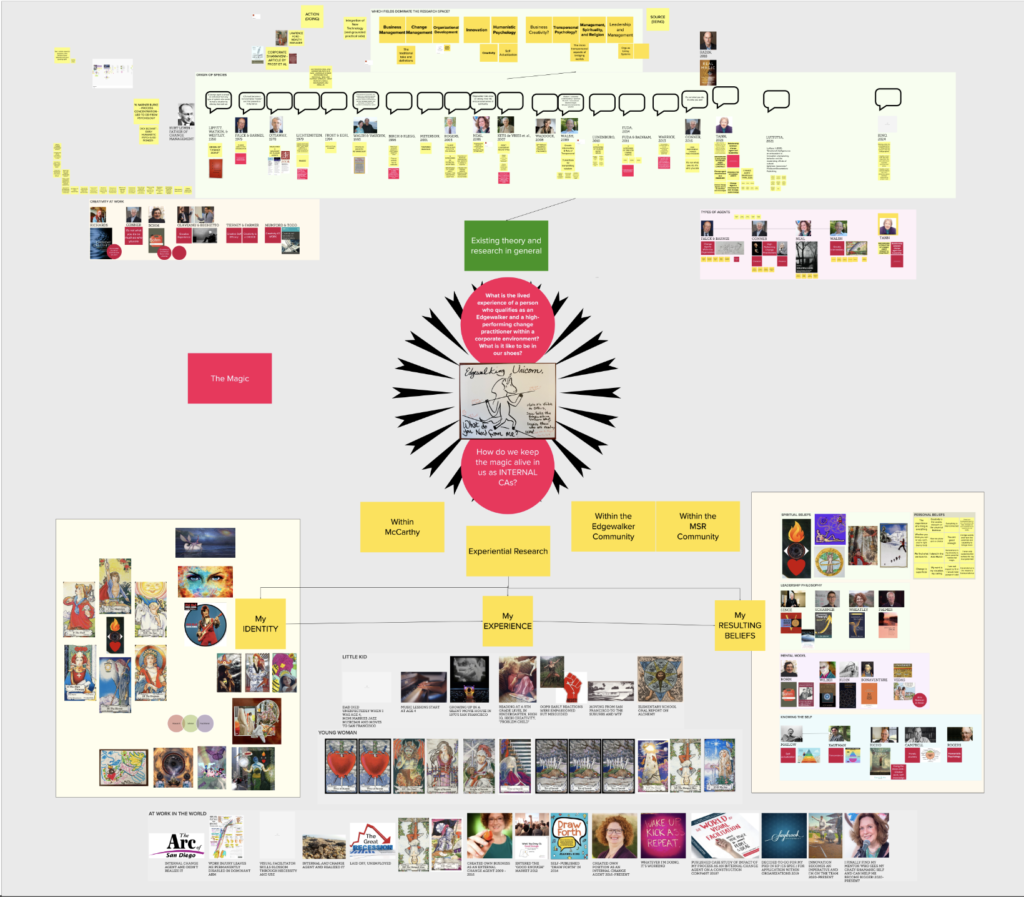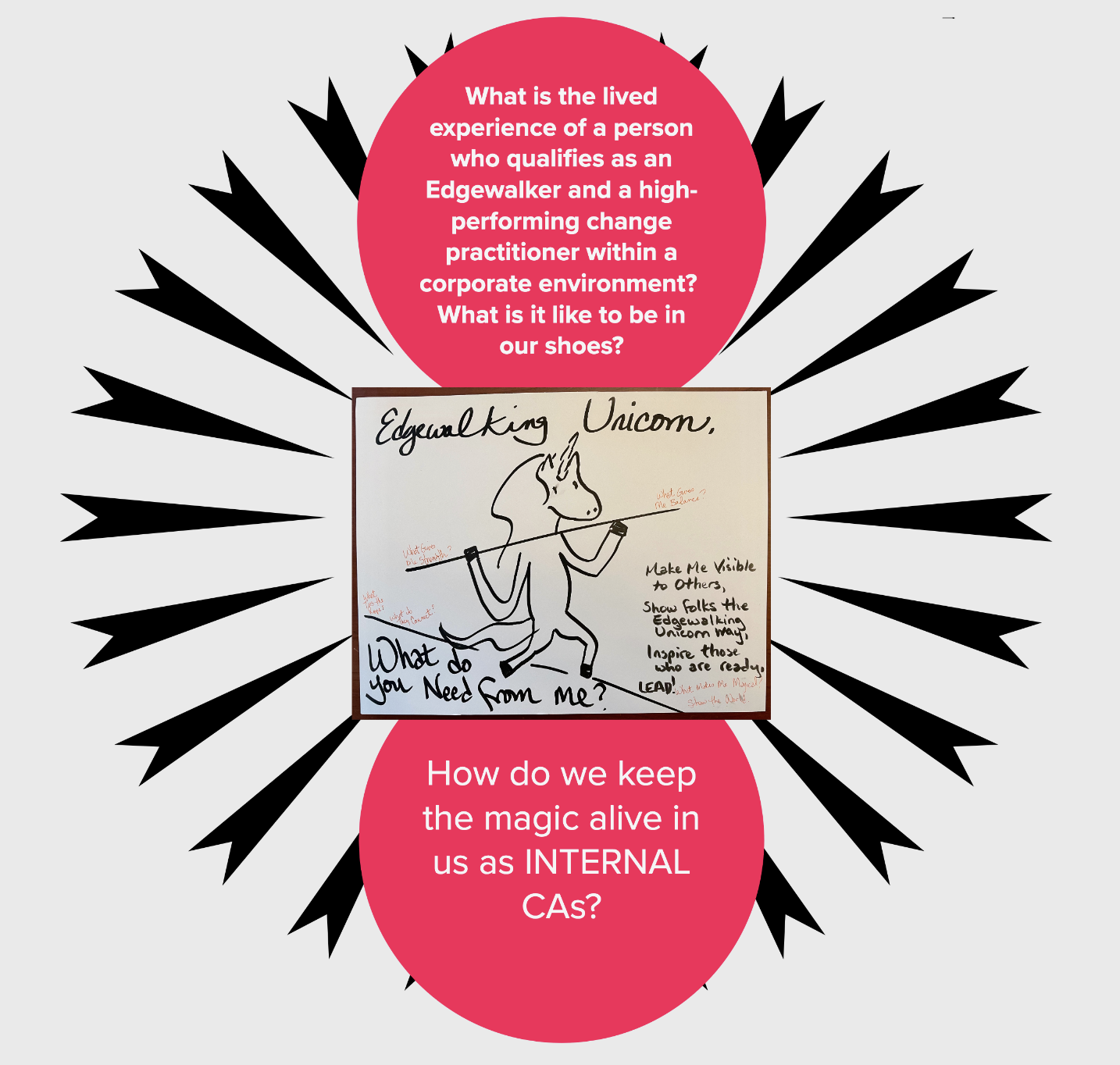Why do I research human experience? Because the experience of a thing is everything. Nothing exists without experience. Through experience we receive and co-create.
Because I do not believe in studying parts to understand the whole.
The purpose of heuristic inquiry is to develop an experiential understanding of human experience. My role as a heuristic researcher is that of the lover and the beloved.
Why is heuristic inquiry the right method to address my problem? Because I’m studying something I intimately experience, so start with that base. Oh my goodness I am tired today as well. But I need to understand the conceptual map assignment a bit better. It’s due this weekend and if I can complete it today that would be great.
Dr. Walker Ladd (instructor of my advanced methodologies course and amazing person) provides a walk-through of a concept map – a visual map – various content and key figures involved in my topic. – reviewing the literature to date – how did my topic come to where it is right now in our understanding?
I will need to be able to speak to my conceptual framework – how I see myself in relationship to the concepts and theories that have been the voices of my topic. Hmm. I’m liking Conner and Neal as a blend.
I get to be creative with my conceptual map. Make it visual in however I decide.
Here we go. Here’s Walker’s conceptual map (conceptual frameworks of Edgewalking Unicorns. – Find an anchoring image to bring my topic to life – Start with – what are the knowledge holders? What institutions of knowledge define high-performing change practitioners, internal change agents in the corporate space? Who owns this area, talks about it, does research on it? – Organizational Behavior, – Organizational Development – Management, Spirituality, and Religion – What are the different concepts that define how I’m coming into this topic? Institutions of knowledge for my topic? – The institutions/collectives associated with each one? – Check the keywords for each author – OD, OB (Conner, Neal) – Humanistic psychology (Maslow, Kaufman – self-actualization) – alternative ways of knowing (WHO?) – Consulting Psychology – Where do Senge, Scharmer, and Wheatley live? Change Makers and transformational change – MSR (Walsh, Conner, Neal) – What are all the parts? From Falck * Barnes to Neal to Conner? Definitions of my terms – change agent, internal change agent, HICP, Edgewalker According to WHO?, who tend to be the unicorns? – WHO is getting researched? What are they looking at in their research? Do I need to look at this during covid? What’s missing? – What is the lived experience when in peak form? When dragging? Because I don’t seem to be allowed to drag.
I still need to clarify my thinking around this conceptual map stuff. It looks like there’s a hierarchical structure for these, with broader concepts at the top and more specific ones down below. It also seems to build from one’s research question: in my case, what is the lived experience of a person who qualifies as an Edgewalker and a high-performing change practitioner within a corporate environment? There also seem to be “affected by” and “leads to” statements or levels of categorization.
Maybe at this point, I’m better off just taking a stab at a conceptual map instead of reading about them. I’m still stymied by the origins of change agents in organizations, though.
Ambivalence seems to be a factor – welcoming us yet rejecting us. On one hand, newcomers enter tradition-bound, pre-existing organizations trying to be on the cutting edge of new developments in their field; organizations that are attempting to meet change by making concrete and consequential adaptations in their goals, policies, procedures, and practices.
But my research may not be about newcomers. It would, however, it would be about innovators or change agents who are purposefully brought into an organization to assist in shaping a new future under the least dislocating conditions. This comes from Falck & Barnes.
Maybe this wants to be a problem pizza. There’s me – the researcher – and my problem/question: what is the lived experience of high-performing change practitioners who are purposefully brought into an organization to assist in shaping a new future under the least dislocating conditions? What happens when that change practitioner is considered a “unicorn” relative to the rest of the organization, where people don’t understand you and the company doesn’t know what to do with you? How does it compare or contrast to the experiences of others in similar positions? And how might the resulting insights help corporate leaders engage in more rewarding partnerships with their Edgewalking unicorns?


